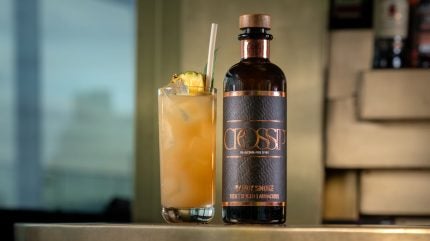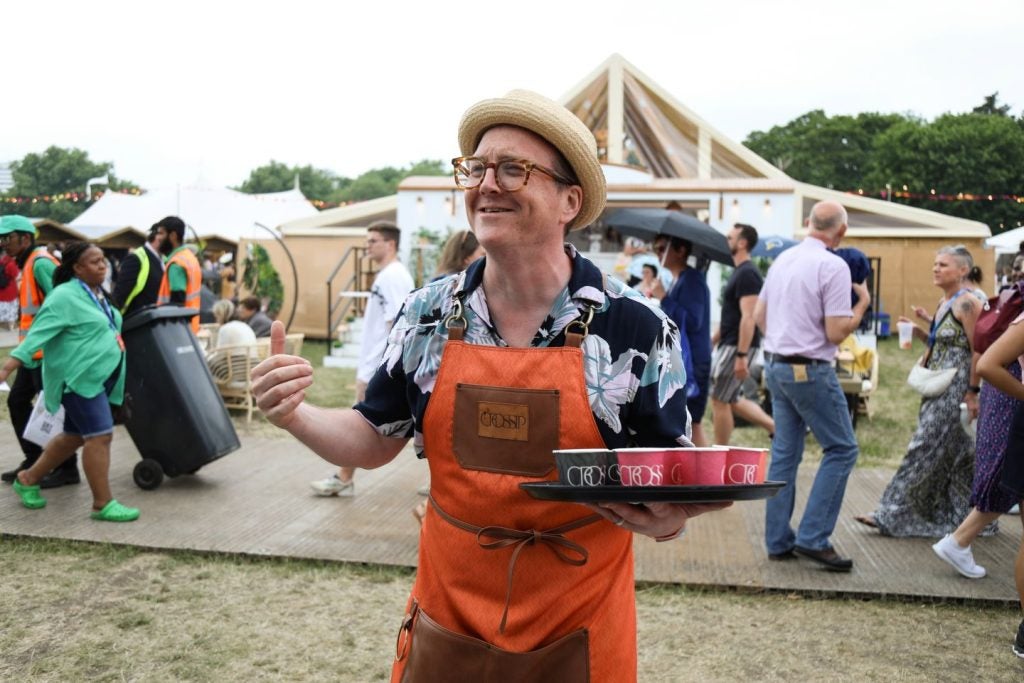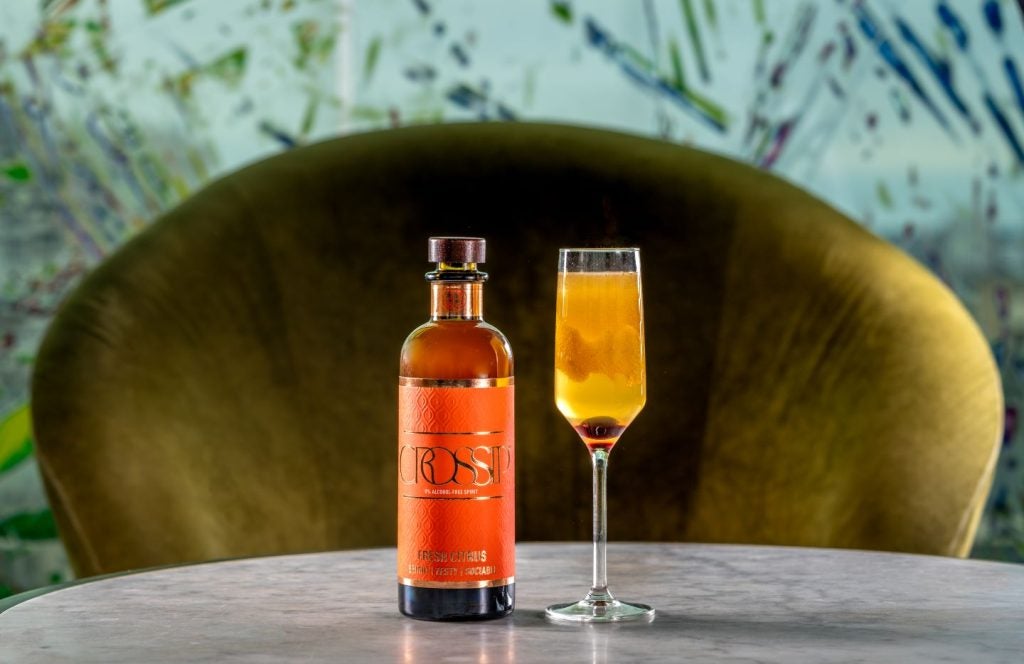
UK-based non-alcoholic spirits producer Crossip, launched by Carl Brown and Tim Blake in 2020, markets four SKUs – the Dandy Smoke, Fresh Citrus Pure Hibiscus and Blazing Pineapple – to 15 countries.
These markets include France, Spain, Germany, the Middle East and South Korea, where the business is principally focused on the on-premise.
Just Drinks sat down with Blake – Crossip’s commercial director – to explore why it sees the on-trade as the ideal channel for developing its non-alcoholic spirits and the opportunities for the brand in the Middle East.
Fiona Holland (FH): At Arena’s Innovation in Non-Alcoholic Beverages conference in March producers spoke about preparing for a “second wave” in non-alcoholic drinks. How do brands, including Crossip, stay relevant in this “new wave”?
Tim Blake (TB): In many respects, it’s don’t try and change too much. I know this is quite a weird thing to say but the worry is that, if you try to change, to adapt to the market, then all you’re going to do is confuse your message, confuse who you are as a brand and everything else. We’re all very young and we’re having to learn that. I think actually we have to be adaptive to the growing category around us and the way consumers are engaging with it more. I think with any brand, it’s to stay core.
Carl asked himself the question [when we were founded]: what makes a great drink? It’s just a simple question and actually what he was trying to work out when he had to make a non-alcoholic menu in a bar – and this is where Crossip kind of started – because he thought to himself what makes a great Negroni or a glass of wine is kind of that taste structure, what it does for your palate, how it makes it interesting, all of these things. We want to talk about the aromas, the flavours, the taste… so that’s where he started with that. It was never an idea of saying: ‘We want to make a non-alcoholic spirit.’ It’s, like, well, how do we make this great drink? We’re all about flavour, or that taste, or that positivity about making great choices when you’re drinking. We’ve never really been about [sobriety] or health and wellness.
FH: Besides moderation, what other consumer trends are driving the non-alcoholic spirits category?
TB: I think actually overcoming moderation is going to be about quality and value and integrity of production and ingredient and understanding where things come from… and how it’s made and who makes it. That kind of integrity is going to be equally as important but then also just people understanding the occasions and where they can use it.
FH: What is Crossip’s presence in on-premise versus off-premise?
TB: [In 2020], we had to launch it into this kind of D2C world… Shopify suddenly became that billion-pound business and everyone was buying online.
Naturally, people aren’t going to pick up a bottle of Crossip and know exactly what to do with it because we don’t really fit. We’re a square peg in a round hole… I’ve often said we’re kind of a disruptive product and disruptive market because we don’t really fit what they’ve kind of said at the start and that was a difficult thing for us. We were on Amazon and we had, people review it going, ‘well, this doesn’t taste anything like whisk(e)y’ [and] we’re not trying to make it taste like whisk(e)y.
The off-trade in general we’ve got a long way to go in non-alcoholic spirits to just be in that general consumer knowledge base.
The off-trade in general we’ve got a long way to go in non-alcoholic spirits to just be in that general consumer knowledge base…. we got the opportunity when it started to open up a lot more within bars and it’s our natural place. I was a bartender at 15, I gave Carl his first job at 18. We’ve been bartenders our whole life… I’ve always been more comfortable there and I think Crossip as a product is more comfortable there. Plus, it’s given us the ability [to do] a lot of export… That’s been a big part of our business because we needed to expand our field of sales quicker, purely because it was smaller in the UK because of the pandemic and everything else.
We’re very much an on-trade product. I also think the non-alcoholic category, spirits especially, has been driven to act quite unnaturally [in relation to] how a spirit brand develops because of quite over-the-top investment within the category. You’ve had a lot of money thrown at a lot of brands early doors… and there’s kind of the idea put into a shop and you sell overseas, right? So all of that is driving it into that kind of retail FMCG space, which means that we’re not spending that time creating that knowledge, which normally comes from the on-trade, bartenders menus, etcetera.
I think the pandemic made the category act quite unnaturally [with] excessive investment from larger brands trying to sculpt the category as to what they felt it should be. It kind of drove a lot of that early narrative of sales and growth. I think if you look at any drinks product, bar maybe things like beer and RTDs, it’s always started in the on-trade. We’ve kind of built that knowledge and then we’ve moved into the off-trade… the best way for us to grow as a category is to expand within the on-trade, hospitality as much as possible, to give that kind of wider awareness to the consumer as to how to use non-alcoholic spirits.

FH: Would you consider heading into new product types like RTDs?
TB: It sounds really easy to say: let’s just make an RTD but, [in] reality, to get scale I probably need to have more than £150,000 ($195,590) to get that off the ground really… The problem is when you’re a small brand you’re just going to be pulling money from somewhere else to go into there. Plus, it’s a completely different way of selling… When you’re a spirit, it’s more of a lower run rate, but more premium pricing, right? So, a can we’re going to sell at £2, a bottle of spirit we’re going to sell at £20. Obviously, we have to sell less of that to make our margin or make a turnover… Then it becomes more off-trade and FMCG, whereas at the moment we’re focusing on on-trade and drink development.
We have got some various ideas for NPD… I’m always a little bit bored by this whole idea of let’s make a non-alcoholic spritz and stick it in a can and expect consumers to just buy it. I think we need to think about occasions more and we’ve got a few things in the pipeline for that.
FH: Where are your most important geographic markets?
TB: The Middle East is probably our most important market. It is our biggest market. We turn over more money in the Middle East than we do in the UK. I mean, at the end of the day, the UK is an incredibly aggressive drinks market and sometimes there’s a little bit of vanity over sanity in growing a brand. [A case of] I want to be the biggest person in my backyard. I’m not a very vain person… so I’m going to let someone else fight that fight for me and I’m going to go where we can sell more. That’s what we try to do. The Middle East presented us with some really great opportunities. First things first, we try and find a good partner and that is not an easy thing. Our model is… find a distribution partner, try and engage with them and grow… In the Middle East, we’re really lucky. We found someone [Drink Dry] pretty much in the first six months. They were a small staff as well. We’ve grown up together. They’re now the biggest non-alcoholic drinks distributor in the Middle East, we’re one of their important core brands. We invest more heavily in A&P into that area, into advertising and such like.
South Korea, we’ve got an opportunity there, and we’re the only non-alcoholic spirit available, pretty much, because there’s a thing about preservatives. We adapted our recipe because we’re small and nimble and could. There’s a couple [other brands] coming now but that in itself is a new challenge. First things first, get there, find a partner, find the challenges that you’re going to have. Target that bar and restaurant. Don’t think you’re going to take over a country. Just look at a city. If you’re going to go to South Korea, you’re basically going to take over Seoul. That’s it. If… you say, ‘I’m really big in the Middle East’, in reality that means you’re doing okay in Dubai, Riyadh is emerging, you’re doing a little bit of work in Bahrain, Abu Dhabi, Qatar, but they’re never going to be big. Big two there are Dubai and Riyadh really now, so [we] target those areas…Dubai is the biggest market; in two years it’ll be Saudi Arabia.
Canada, we’ve built a bit of a foothold there. We’ve built a better team and we’ve got a better look. Germany, the same thing as well, so more feet on the ground. This year is probably about growing Canada, North America. We’re not in the States at the moment because it’s difficult. It’s problematic.
We now warehouse stock in Amsterdam. One of our biggest barriers was people didn’t want to buy stock from the UK because of Brexit… We ship and hold stock in Amsterdam and then we move from there. Basically, you can then sell internally within the EU under their VAT numbers but essentially it means now the barrier to entry is a lot less for Europe. I’m growing the European market a lot better because of that, cuts down on costs and everything else.
There’s lots of little things in the pipeline. We often get market people coming to us. Someone from Malaysia popped up the other day, so we’ve got some stock going out to Malaysia into a kind of expat [region], and that might lead into some more in Asia. All markets are slightly different. Barriers to entry are very different, barriers to growth are different. It’s about learning and adapting and growing as best we can.

FH: Why are you not in the US? Do you have plans to enter the market?
TB: I think with the [US] I’m just very mindful that I want to be in a better position as a business. I don’t want the business at risk just because we’re going to open up another market. I think we can sell a bit of stock elsewhere. You’ve got to be careful of how much you bite off [before] you can chew.
Just because you’re not drinking alcohol doesn’t mean you don’t want quality or choice.
FH: What are your sales volumes and how much are you looking to grow those by in the next 12 months?
TB: We’ve had good growth. I think this year will be slightly transformative and the same as last year… last year we did about 50,000 bottles. This year we hope to be 80 to 100,000 bottles, so good volume. I think time will tell on some of that.
My world can be a lot about turnover and how many bottles we’ve sold and we’ve got investors, and we have expectations and everything else that goes with it… Actually, what we’re trying to do this year is [turn a] profit to be honest. In the drinks start-up world, you invest, invest, invest. In a challenging investment market this past year… let’s be honest, you can put £100,000 in the bank and make 5% on it. Who’s going to go to a start-up and go ‘Well, there you go. Here’s my money’ and everything else? Obviously, it’s been more challenging, because [of] the world we’re in at the moment… there [were] a lot of brands [embracing] that unicorn-chasing idea… I think that time is a little bit over, certainly within drinks. We understand as a business that we want to be a business that’s sustainable, that can pay its employees well, that can be a business that’s turning over profit and turnover and be a bit more controlled over where it spends everything else.
I’d like to think that we are going to be getting towards that 70%, 80%, 90%, 100% growth next year.
FH: What are the main challenges and opportunities for growth for non-alcoholic spirits at the moment?
TB: Challenges are opportunities… that’s always the way you’ve got to look at this, I think. Otherwise, you’d end up sat in a ball, rocking and crying. The challenge is always about consumer knowledge, consumer engagement. And when I talk about consumers, I’m talking about whether that be a trade consumer, bartender and a bar owner, et cetera.
Within the spirits category we are the only spirit on a bar that’s maybe completely 360, right? We can make great non-alcoholic drinks but then we can also be added into normal cocktails as an ingredient to enhance that quality of that cocktail’s flavour. Dandy Smoke, which is our smoky one, 5ml of that is phenomenal in a whisk(e)y cocktail because it gives it a bit of lift. So, I think the opportunity is for us to really realise the potential of a non-alcoholic spirit… in any setting, whether that be at home or in a bar.
I think that younger generation obviously is an opportunity, because there is absolutely a social change afoot, where there [are] people drinking less… and, for that, the opportunity is that people will still want to drink something better. Just because you’re not drinking alcohol doesn’t mean you don’t want to improve you’re drinking, don’t want quality, don’t want choice, don’t want all of these things.
We need to just keep really driving on that knowledge and remembering that what we’re trying to sell is how to drink non-alcoholic spirits, that whole idea.
Statistics show we’re in a growth category. We know where we are. We know that all the big companies, big brands, would not be investing their millions and billions of pounds in NPD, innovation and all those sorts of things if there wasn’t a market to be [had].



